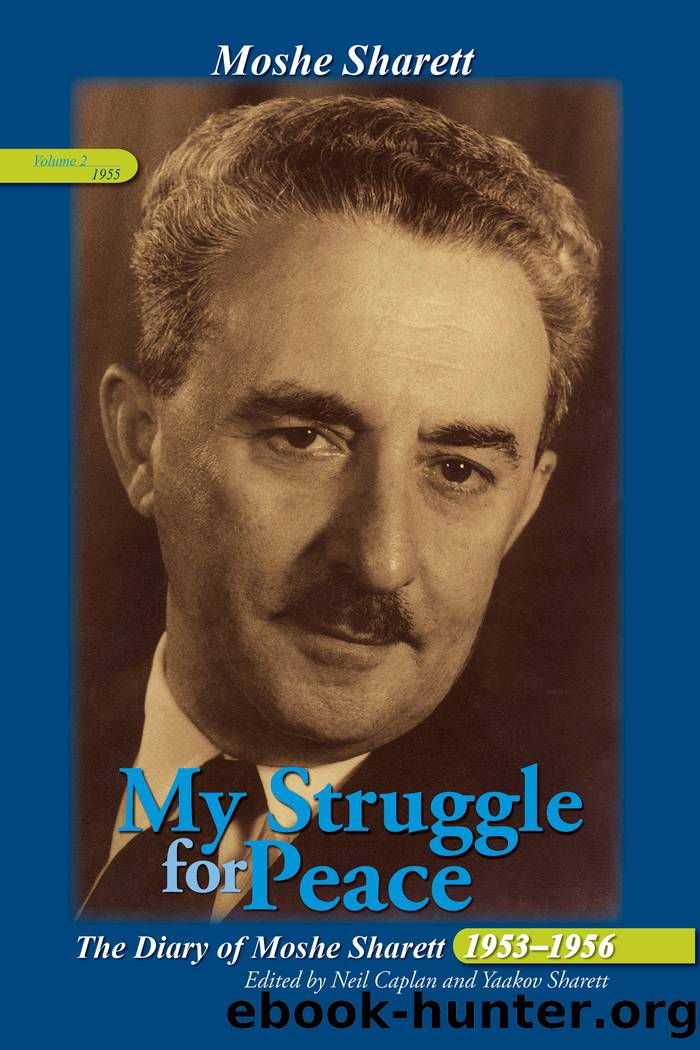My Struggle for Peace by Unknown

Author:Unknown
Language: eng
Format: epub
Publisher: Indiana University Press
Published: 2019-12-14T16:00:00+00:00
Moshe Sharett, General Bennike, Yosef Tekoah, General Burns and Henri Vigier (Left to right) Sharettâs office, Jerusalem
1 In April 1955, before the Bandung Conference, U Nu had informed Minister David Hacohen of his decision to visit Israel on his forthcoming trip to the US. While in Bandung, the Arabs participating in the conference, aware of this plan, invited him to visit Egypt too. Since this was found impossible technically, he decided to cancel visiting Israel. On April 29 Hacohen was invited to the PMO in Rangoon, along with the ambassadors of Japan, Britain, Yugoslavia and the US chargé â all the countries on U Nuâs itinerary. In the presence of all these, the Burmese Prime Minister told Hacohen of his decision to cancel his visit to Israel. Hacohen decided on the spot â against all the rules of correct diplomacy â to castigate U Nu. In a long impromptu speech he accused U Nu point-blank of succumbing to unfair Arab pressure. When he had finished, a long silence ensued and then U Nu raised his reclined head and said to Hacohen that he could inform his government that the visit would take place after all. Hacohen, Time to Tell, 214-18; also David Hacohen, Yoman Burma: Rashmei Shelihut [Burmese Diary], 1953-1955 (Tel Aviv: Am Oved, 1963 â in Hebrew), 458-65. The visit of a Prime Minister â the first of its kind in Israelâs history â was considered a major psychological boon for the beleaguered country at the time.
2 A different translation of the above discussion is presented in Israel in the Middle East: Documents and Readings on Society, Politics and Foreign Relations, Pre-1948 to the Present, 2nd ed., Eds. Itamar Rabinovich and Jehuda Reinharz (Waltham MA: Brandeis University Press, 2008), 127-29.
3 ISA FM file 130.02/3 5936/25 contains several notes from Tekoah to Eban following the acrimonious discussion on reprisals.
4 âDuring the consultations Moshe Sharett had been quite nervous. He had the feeling that the ambassadors and the Foreign Ministry people did not properly understand the difficulties he was facing in the battle against certain reprisals, and they were expecting from him results that he would not be able to deliver.â Kollek to Shiloah, May 31, 1955, ISA FM 130.19/4374/7.
5 Allonâs speeches in Tel Aviv and Haifa (âThere has never been a government which wasted a military victory as did the Ben-Gurion governmentâ) were reported in Lamerhav, May 8, 1955.
6 For Kollekâs perspective on the ambassadorsâ consultations, Sharett-Ben-Gurion-Eban relations, and U Nuâs visit to Israel, see Kollek to Shiloah, May 31, 1955, ISA FM 130.19/4374/7.
7 For details on the fighting near Nirim, see Morris, Israelâs Border Wars, 336.
8 On the meeting with Lawson, see below, entry for June 3 and DFPI 10, doc.242. On the meeting with Nicholls, see DFPI 10, doc.243.
9 David Dubinsky (1892-1982), American labor leader, served as President of the International Ladiesâ Garment Workersâ Union (ILGWU), 1932-1966; a founder of the Council of Industrial Organizations (CIO).
10 In the course of their tense meeting on June 1, Sharett had
Download
This site does not store any files on its server. We only index and link to content provided by other sites. Please contact the content providers to delete copyright contents if any and email us, we'll remove relevant links or contents immediately.
Kathy Andrews Collection by Kathy Andrews(11830)
The remains of the day by Kazuo Ishiguro(8997)
Spare by Prince Harry The Duke of Sussex(5194)
Paper Towns by Green John(5188)
The Body: A Guide for Occupants by Bill Bryson(5095)
Industrial Automation from Scratch: A hands-on guide to using sensors, actuators, PLCs, HMIs, and SCADA to automate industrial processes by Olushola Akande(5061)
Machine Learning at Scale with H2O by Gregory Keys | David Whiting(4312)
Be in a Treehouse by Pete Nelson(4051)
Never by Ken Follett(3953)
Harry Potter and the Goblet Of Fire by J.K. Rowling(3856)
Goodbye Paradise(3809)
The Remains of the Day by Kazuo Ishiguro(3408)
Into Thin Air by Jon Krakauer(3397)
Fairy Tale by Stephen King(3391)
The Cellar by Natasha Preston(3342)
The Genius of Japanese Carpentry by Azby Brown(3308)
120 Days of Sodom by Marquis de Sade(3273)
Reminders of Him: A Novel by Colleen Hoover(3115)
Drawing Shortcuts: Developing Quick Drawing Skills Using Today's Technology by Leggitt Jim(3080)
